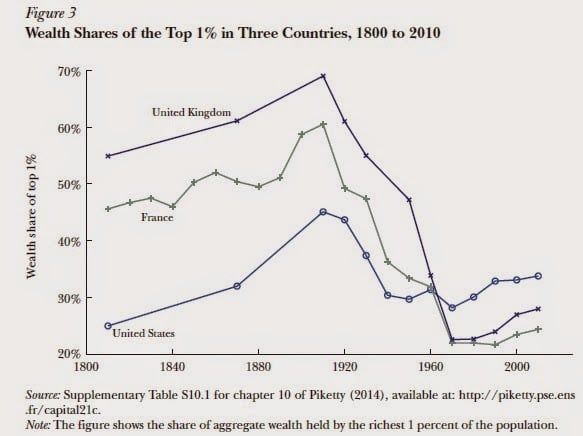Aw man, imagine using technology to reduce the amount of time people had to spend working, rather than making rich people more money… what a crazy world.
It’s wild some of the creative settings they come up with in fantasy!
Read a cool new guys book, the author is George Orwell, I think you’ll like him!
It’s crazy. I’ve read in a few books (fiction, of course) that mention, in passing, that the 40 hour workweek was now replaced by a 32 hour workweek, or something similar.
When do we get to reap the benefits of all of these boosts to productivity?
“Worker productivity” has been going up for 50 years, but compensation hasn’t been. That extra money goes into the pockets of the board and shareholders and CEOs.
80 years ago, the average CEO pay was about 20x the lowest pay in his company. Now, instead, we have billionaires.
We have had ultra-rich people and major wealth inequality for most of American history. Rockefeller (1838-1937) amassed a fortune in the 1800s in excess of $400B inflation adjusted dollars. By most measures, he was the richest American of all time.
The second richest American of all time is up for debate but contenders include Andrew Carnegie (1835-1919), Cornelius Vanderbilt (1794-1877), Henry Ford (1863-1947), or Bill Gates (1955-present).
Wealth inequality has obviously grown over the past 50 years but it’s worth noting that wealth inequality in general is not a uniquely modern problem. It is also exaggerated by comparing to the 1970s, where wealth inequality was at a historical low point (see graph below)

I’m not talking about the single outliers at the top, but about the “billionaire class” in general, it’s a pretty modern concept. There’s a reason I said “Average” and not “Richest”
Yes, if we go back to before 1900 the wealthiest people had more of the pie, but this is largely a product of the bottom of society having, essentially, nothing. 1800s societies were capable of producing enough for (most people) to survive, and there wasn’t much excess “wealth” to go around. While the rich collected most of that, the difference is in the scale of “available resources.” It’s not a comparable system when most of your population are serfs.
I don’t find it encouraging to say “oh well, this isn’t unique, look it used to be like this 100 years ago!” when 100 years ago the quality of life for regular people was abysmal.
The fact that your graphs show wealth inequality steadily growing is the major concern. We had a more equitable society in the 1970s by a long shot. Our current state isn’t inevitable, it’s a result of the policies we’ve implemented. With current trends, do we want our society to return to those dynamics of the1800s? In a world where we’ve so much automation and wealth in the world that we could care for everyone why do people still have to work 40+ hours a week just to get by?
Funny you should say “we” and “American History” though :) Maybe the American model is the problem here.
You said “now we have billionaires” like it’s a new phenomena. The graph I posted tracks the total wealth share of the top 1% wealthiest people, which is a much better picture of income inequality than the “average CEO”. Notice that the total wealth share went from 30% to 35% since its low in 1970, which is a much smaller change than the 200+x difference that people like to quote.
While inequality is growing, it’s not nearly as dramatic as people make it out to be and in 2023 we are far closer to that 1970s low than we were a century ago
In a world where we’ve so much automation and wealth in the world that we could care for everyone why do people still have to work 40+ hours a week just to get by?
I don’t disagree with you. Most people in white collar jobs realistically don’t get more than 5 hours a day of real productive work done to begin with. Why do we need to be at the office for 8 hours?
I just think it’s important to look at the data in an objective way. Instead of posting inflammatory comments on Lemmy that exaggerate the situation, you could try lobbying your representatives for better worker protections.
Funny you should say “we” and “American History” though :) Maybe the American model is the problem here.
Well, I’m American lol. But the trends are similar in almost every developed country so I don’t think this is an American problem.
Your first argument is, again, very American-centric - yes the rate that wealth inequality is growing in the USA is less pronounced than in other places, but it was always pretty bad in the USA. The argument that “trends are similar in almost every developed country” is also a little disingenuous - it’s true for the G8. In many European countries, they’re actually taxing the wealthy sensibly and putting that money into public services to make everyone’s lives better, the wealth gap is much smaller and the quality of life and happiness of regular people is better.
Again “a century ago” or longer doesn’t matter because it’s pre-industrial revolution. The total amount of “wealth to go around” was much smaller, and we were living under very different systems.
If a king or an emperor owns 50% of the wealth of a nation, and everyone else is equal, then yes, your graph will show “the top 1% have 50% of the wealth” but also your system is specifically designed to give all the money to one person. Arguing “well 100 or 200 years ago this was worse” is moot, because we’re comparing different systems… Unless your point is that our current system is also designed to deprive all wealth and comfort to the masses to enrich a select few, and we should be “thankful” that it’s less good at it.
We have to compare within the same system, and look for the best we can do. Unless you’re specifically arguing that the wealth distribution in the 1970s is unsustainable, then that’s an example of when we were capable of doing better, and it’s okay to find that as something to aspire and build towards.
Lobbying your representatives for better worker protections is a joke, especially in America. Many representatives in the USA don’t even hold surgeries, you can’t talk to them directly. You can write them a letter, which they ignore. Rich corporations pay our representatives massive donations to their campaigns (or in other countries, they pay them via more circuitous routes), and they get the policy that benefits them.
Here’s an example - Back at the start of the Trump administration, a bill was written by the house to make it legal for ISPs to sell your private information and browsing history to corporations for their own profits. A number of polling institutions went around and took some credible large-scale polls of public opinion about this. 98% of respondents opposed the bill. The legislation passed congress and is now law. Who’s “lobbying” of congress matters? individuals, or Comcast?
There are a very small number of US representatives who refuse to take money from large corporations - and those, in general, seem to hold the interests of the people to heart. Before “lobbying your representatives” can work, there needs to be widespread grassroots movements to elect more of these people. Until that happens, there aren’t representatives, there are rulers.
It’s not inflammatory to argue for better systems. It’s not a lie that while we’ve had a massive industrial revolution that increased the productivity of workers, those benefits have not been seen by the workers. We still work just as long, and just as hard, for an ever diminishing amount of the pie. You can say “oh but you have a fancy car” but… just look at the percentage of people who own their own home by generation. The current trends are extremely concerning and need to change.
…
A century ago was post Industrial Revolution and after the advent of mass production as a common means to produce goods. This was also past the time where many European countries had moved to a parliamentary system.
I’m not sure if you are just ignorant of history or what.
It’s not inflammatory to argue for better systems.
It’s inflammatory when the statistics are being presented in a misleading way, which you and many others are guilty of. We can discuss how to improve the system without that sort of thing and it’s not productive to actually seeing change get made.
It’s not a lie that while we’ve had a massive industrial revolution that increased the productivity of workers, those benefits have not been seen by the workers.
It certainly is. Our living conditions have consistently improved in many ways as a result of industrialization.
You can argue that we could see more benefit and I’d agree with you, but to act like the average person hasn’t benefitted from industrialization is disingenuous.
on top of this, in the US, most workers have unpaid lunch breaks to some of us are stuck at work for 45 hour weeks, plus commute times are increasing over time so we’re practically spending 50+ hours a week committed to our job with the same pay from a decade ago
There were some fairly major studies in the UK last year, across many companies and multiple industries, where they reduced the 5 day workweek to a 4 day workweek, whilst keeping the compensation of workers the same overall (i.e. salaried workers got the same salary, hourly workers got 25% more per hour)
The majority of companies involved in the study found that their workers were significantly healthier and happier after adjusting to the new schedule… and as a result significantly more “productive”. Profits even went up despite the reduced working time. Most of them elected to keep with the new system once the study ended.
Obviously you can’t do this with every industry, certain industries need 24/7 coverage or the like… you can’t run an ER 4 days out of 7 - but the takeaway is that it’d be better to employ more people for less time and pay them well - you’ll get better results than you will with an exhausted and depressed workforce
In many ways, we have been. The average person has casual access to goods and services that would have been immensely inaccessible without industrialization. Consider the average car for example. The engine alone has hundreds of tightly toleranced parts working in a mechanical dance to harness thousands of controlled explosions per second. That doesn’t even touch on the complex support systems required for engine management or chassis/suspension. I can buy a well running used car for less than the cost of a month’s rent.
Compare that to the pre-industrial era, when a simple shirt would have taken a single person 500-600 hours in manual labor to make starting from raw wool. That’s more than three months’ work with a 40 hour work week.
It’s truly amazing that any minimum wage worker in the USA can buy multiple used cars, a monumentally complex piece of machinery by any historical standard, for less labor than it would take to get a new shirt a few hundred years ago.
That said, I do believe we have the capacity to get these benefits PLUS reduced work hours. We will see that when we demand better worker protections from lawmakers and stop equating a human’s value to society with the number of hours they work each week.
I’ve seen this argument before.

Maybe if you shill for billionaires a bit harder they’ll give you one of their yachts.
If you think we are materially worse off now than we were before the introduction of automation you are either pushing hardcore propaganda or absolutely delusional.
Real median middle class income has stayed effectively constant since the 1980s. However, with automation the variety of goods available at that income level have dramatically improved. This is the benefit that the consumer sees and pretending it’s not a real benefit is disingenuous at best.
Maybe if you shill for billionaires a bit harder they’ll give you one of their yachts.
You really think so? That would be amazing
“Real median middle class income has stayed effectively constant since the 1980s”
That’s the entire point that was being made in the first place! Productivity has increased massively, income has “stayed constant” - So, we’re working harder and producing more for the sole benefit of the rich.
While it’s true that new inventions do make people’s lives materially better, the point that’s being missed is… this is an inevitable consequence of the development of society, we’d have these new inventions regardless of our economic systems or choices of where to tax people, or economic policy. Those benefits aren’t caused by the widening wealth gap, and the wealth of billionaires isn’t required for new inventions to be made.
What we’re talking about here, specifically, is that people are producing more wealth, but not getting wealthier. The wealth of people has “effectively stayed constant since the 1980s” but the total wealth we’re creating has gone up significantly. It’s certainly nice that we have more things we can spend that wealth on, but that’s a distraction from the issue of where the rest of the wealth is going.
If you actually look at people’s lives, “materially” and look past the inevitable march of technology, what else is happening? 70% of people are “living paycheck to paycheck”; poverty, and child poverty are massively increasing; many schools can’t afford to give children textbooks; and teachers have to buy school supplies out of their own meager paychecks; the cost of healthcare is increasing, leaving many unable to afford it (or in non-USA countries, where everyone can afford healthcare, waiting lists are increasing due to poor funding); Towns are bankrupt and can’t afford to repair infrastructure; the quality of most goods (clothes, houseware, and furniture especially) are decreasing to the point where they fall apart in a few years; and most public services are on the verge of collapse.
The cost of housing is so high that younger generations don’t even aspire to own a home any more, the cost of higher education is so high that people expect their student debts to never be paid.
So yes, it’s nice that we have Facetime and Playstations, Those things do make our lives better… but you have to consider, if the “increased productivity” of workers was going towards society and making our lives better instead of enriching billionaires, could we address some of this?
My dude, this is pretty uncontroversial, mainstream economics and sociology, which is being backed up by actual data. You are so terminally online, you are literally rejecting any message which isn’t wrapped in populist fan service. Do better. Touch grass.
Can you provide a single metric which demonstrates that modern humans are worse off than they were 200, 100, 50, 20 years ago?
Sure. Let’s take 20 years.
Healthcare outcomes are worse. Healthcare is more expensive. Life expectancy is lower. Fewer people can afford to buy a home. Fewer people can afford to retire. Commutes are longer. People have to work more hours in a week to get by. A higher percentage of people are living paycheck to paycheck. Infrastructure is collapsing. Towns are in more debt. Higher education is VASTLY more expensive. Literacy rates have decreased. A vastly higher percentage of people work two jobs to make ends meet A vastly higher percentage of households require two working adults, rather than one working adult, to pay bills.
But sure go off about how it’s so great we have the Apple Vision Pro now.
Pretty sure Life Expectancy and Literacy Rate are both higher in 2024 than in 2004, whether you look at US or Worldwide statistics.
Most of the other metrics aren’t really measurable, and while I agree with some of those, you definitely didn’t factcheck before writing.
When we hit peak population. This will be the next historical epoch which dramatically changes the fabric of society, because it will lay bare the finite nature of surplus labor, as well as dramatically skew the ratio of workers to retirees. It won’t completely eliminate capitalism, but it will largely be the end of consumption driven economics, and will force more and more of this surplus productivity to go towards supporting populations instead of enriching a privileged few.
There will simply be no other option. In some places this will happen violently, but in many places it will be a slow but peaceful transition.
When heads roll
I mean, knights weren’t exactly poor people. This knight found a way to make his serfs make him more money.
Yeah, IIRC a knight’s suit of armor and weapons alone were worth more than most people in medieval times would ever earn in their entire lifetime. Knights traveling on horseback were the modern day equivalent of a celebrity rolling around town in a Ferrari
Iron and steel were a precious metals at one point in time.
Funnily enough, not because iron isn’t abundant (it’s super abundant). Rather, because the medieval process of smelting required a LOT of fuel for even a small amount of iron.
Very similar to how aluminum was a rare metal.
While many knights were lords and vice versa, they weren’t always
“But if I keep sending more wheat to the dragon, I’ll get to be a dragon one day. They told me so on the Internet.”
And G-Money is going to be a vampire any day now!
Thats not fair. Gizmo became a vampire and then decided he’d rather be human.
Dammit, spoilers! I’m still at s4e2!
It’s actually quite fitting that the knight, part of the aristocraty, isn’t interested in Kapital
eh, knights were a tad more worldly and should at least realize that it’d be fucking brilliant to not starve when going to war, which has historically been a massive issue.
More efficient labor means less issues when drafting all my levies, which in turn means more meat between me and the actual danger
The knight,fifteen years later…
Ok,I finally got the gold. Had to kill twenty thousand peasants for it. Took me ages.
The arts also tend to flourish with technological innovation making other tasks less time-consuming. More comics with this cool dragon could be made.
I can’t go back to the princess with this nerd shit
LOL!
Nerds, annoyingly being useful. Being useful while being annoying
Gdam nerds
This is amazing! Now we’ll be able to free humans from manual lab-
Cotton Gin gets invented
I’m just gonna leave this here
I did’nt expect that, lol.
Discovered this community and subscribed. Thanks ♥
Thresh from League of Legends suddenly makes even more sense! The whole reaper\agriculture analogy is amazing.
Thank you for sharing this here and thank you so much for also linking the source! I love to see it!! Both the comic and the sourcing each made me smile and I appreciate ya! :)
Another Maoyu fan.
I prefer hand cranked winnowing for my hobby grain processing, personally, I think the Dragon was making too big a leap straight to fully automated threshing.
EDIT: My dictionary apparently doesn’t think winnowing is a word ffs
Gotta upgrade to the Nerd Dragon Dictionary
The Nerd Dragon is my spirit animal.
The industrial dragon revolution.












